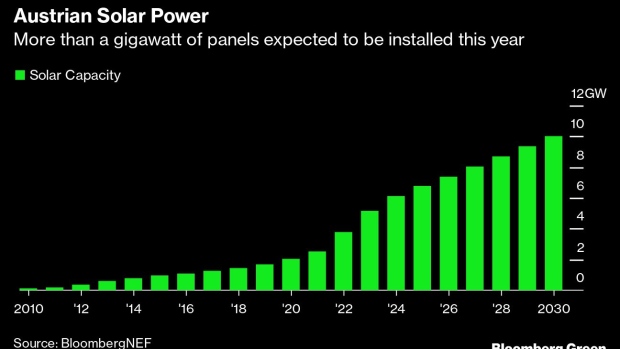May 6, 2022
Russia’s War Teaches Austria the Security Role of Wind and Solar
, Bloomberg News

(Bloomberg) -- Russia’s war on Ukraine is catalyzing Europeans to demand greater energy independence and convincing leaders that power from renewables is essential for ensuring national security, the Austrian energy minister said.
“This is really the one thing that has changed most,” Leonore Gewessler said in an interview in Vienna. “It was always sensible to go renewable for climate reasons, but the amount to which we can produce our own energy in Europe, in a safe and resilient and renewable way has also become a matter of security policy.”
“It’s a matter of our ability to act, to be sovereign, to be free.”
The Austrian government’s minority Green Party minister in charge of climate, energy and transportation policy expects new solar and wind installations in Austria to hit record highs in 2022. Gewessler said some fundamental economic assumptions may have to be revisited in order to break Russia’s half-century stranglehold over gas supplies.
“We have in the past maybe paid too much attention to competition and low prices and too little attention to the question: ‘how do we have an industrial base in the renewable technologies and supply chains we need in Europe,” according to Gewessler, who also said European Union nations need to boost solar and storage manufacturing capacity.
While the security implications of global warming have focused the attention of intelligence and military officials, Russia’s invasion of its neighbor highlight the broader economic vulnerability of over-relying on fossil fuels, Gewessler said. EU climate chief Franz Timmermans has urged members to pick up the pace of renewable-energy investments rather than making Russian President Vladimir Putin rich through more gas purchases.
Austria Could Require Years to Cut Off Russian Gas Entirely
Austrians, who get about 80% of their gas from Russia, are being forced to face “uncomfortable truths” about just how much of their economic wellbeing stems from Kremlin-controlled fuel inventories, Gewessler said. The Alpine country may need another five years to eliminate Russian imports entirely, according to a report last week by the Austrian Energy Agency.
To accelerate the shift, Austria is introducing a tax on carbon dioxide emissions from July, while also providing broader access to subsidized public transportation. Economists have confirmed the government should “stick to this plan” despite record energy prices in order to send the right signals to consumers, Gewessler said.
Austria is also planning to challenge the European Commission’s so-called taxonomy of green finance published last year, which opened the possibility of support for gas and nuclear power.
“It’s a greenwashing program for fossil gas and for nuclear energy,” Gewessler said. “We have better alternatives that do not pose any harm. If the commission goes through with it, we will challenge it.”
©2022 Bloomberg L.P.







